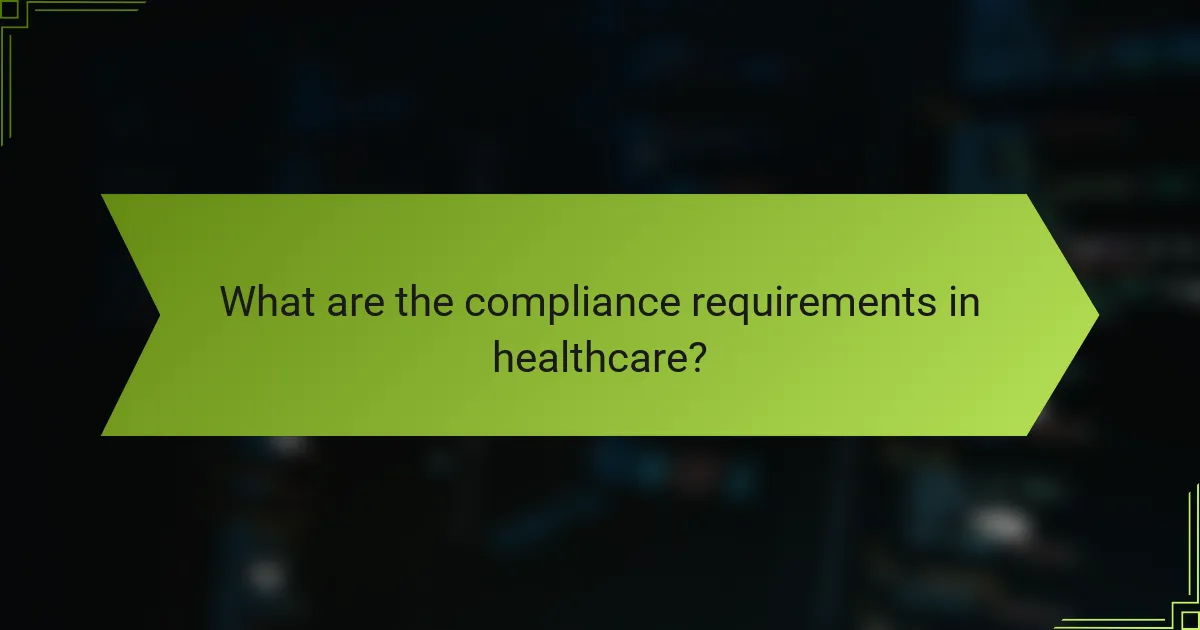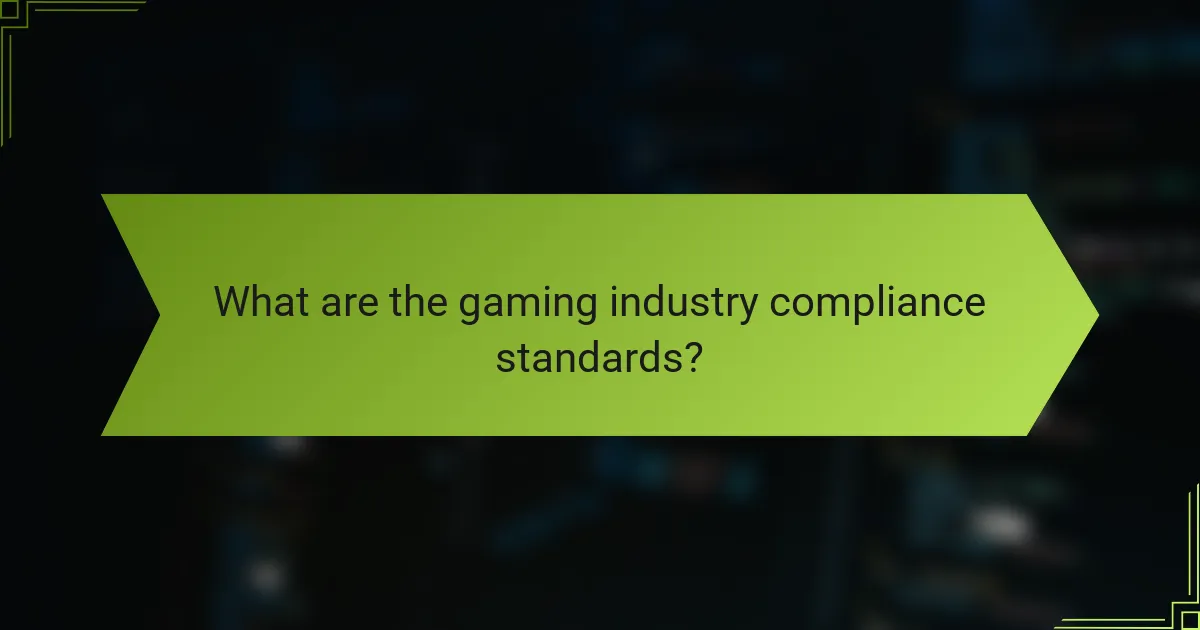Industry-specific compliance is essential for maintaining standards and protecting stakeholders across various sectors such as healthcare, education, gaming, and finance. Each industry faces unique regulations that govern practices, from safeguarding patient information in healthcare to ensuring fair play in gaming. Understanding and adhering to these compliance requirements is crucial for organizations to operate effectively and ethically.

What are the compliance requirements in healthcare?
Compliance requirements in healthcare focus on protecting patient information, ensuring quality care, and adhering to various regulations. Key areas include patient privacy, billing practices, and state-specific laws that govern healthcare delivery.
HIPAA regulations
The Health Insurance Portability and Accountability Act (HIPAA) establishes national standards for protecting sensitive patient information. Healthcare providers, insurers, and their business associates must implement safeguards to ensure confidentiality, integrity, and availability of health data.
Key components of HIPAA include the Privacy Rule, which governs the use and disclosure of protected health information (PHI), and the Security Rule, which sets standards for electronic PHI. Non-compliance can result in significant fines, ranging from thousands to millions of dollars, depending on the severity of the violation.
Medicare compliance
Medicare compliance involves adhering to federal regulations that govern the provision of services to Medicare beneficiaries. Providers must ensure accurate billing practices and meet quality standards to avoid penalties and maintain reimbursement eligibility.
Common compliance areas include proper documentation, adherence to coverage guidelines, and timely submission of claims. Providers should regularly conduct audits and training to minimize errors and ensure compliance with Medicare rules.
State-specific laws
In addition to federal regulations, healthcare providers must comply with state-specific laws that can vary widely. These laws may address licensing requirements, scope of practice, and patient rights, impacting how services are delivered.
For example, some states have stricter privacy laws than HIPAA, requiring additional safeguards for patient information. Providers should familiarize themselves with local regulations to avoid legal pitfalls and ensure comprehensive compliance.

How to achieve compliance in education?
Achieving compliance in education involves adhering to various regulations and standards that govern the operation of educational institutions. Key areas of focus include federal guidelines, state laws, and accreditation requirements that ensure the protection of student information and the quality of education provided.
FERPA guidelines
The Family Educational Rights and Privacy Act (FERPA) is a federal law that protects the privacy of student education records. Under FERPA, educational institutions must obtain written consent from students before disclosing personally identifiable information from their records.
To comply with FERPA, schools should implement clear policies regarding data access and sharing. Regular training for staff on FERPA requirements and maintaining accurate records of consent can help avoid violations and protect student privacy.
State education regulations
Each state has its own set of education regulations that institutions must follow. These regulations can cover a wide range of topics, including curriculum standards, teacher qualifications, and student assessment protocols.
Schools should regularly review state regulations to ensure compliance, as these laws can change frequently. Engaging with state education departments and attending relevant workshops can provide valuable updates and resources for maintaining compliance.
Accreditation standards
Accreditation is a process through which educational institutions are evaluated against established standards to ensure quality and accountability. Accreditation bodies set specific criteria that institutions must meet to gain and maintain their accredited status.
To achieve and uphold accreditation, schools should conduct regular self-assessments and gather feedback from stakeholders. Developing a comprehensive improvement plan based on accreditation standards can help institutions remain compliant and enhance educational outcomes.

What are the gaming industry compliance standards?
The gaming industry compliance standards encompass a range of regulations and practices designed to ensure fair play, protect consumers, and maintain the integrity of gaming operations. These standards vary by jurisdiction but generally include federal regulations, state laws, and responsible gaming initiatives.
IGRA regulations
The Indian Gaming Regulatory Act (IGRA) establishes the framework for regulating gaming on tribal lands in the United States. It requires tribes to negotiate compacts with states, which outline the types of games allowed and the revenue-sharing agreements. Compliance with IGRA is essential for tribes to operate legally and avoid penalties.
Key aspects of IGRA include the classification of gaming into three categories: Class I (traditional tribal games), Class II (bingo and similar games), and Class III (casino-style games). Each category has different regulatory requirements, impacting how tribes can conduct gaming activities.
State gaming laws
State gaming laws vary significantly across the U.S., with each state establishing its own regulatory framework for gaming operations. These laws dictate licensing requirements, operational standards, and taxation rates. Operators must stay informed about their specific state’s regulations to ensure compliance and avoid legal issues.
For example, some states require extensive background checks for gaming employees, while others may have specific rules regarding advertising and promotions. Understanding these nuances is crucial for maintaining compliance and fostering a responsible gaming environment.
Responsible gaming measures
Responsible gaming measures are designed to promote safe gaming practices and prevent problem gambling. These measures often include self-exclusion programs, age verification processes, and educational resources for players. Compliance with these initiatives is not only a legal requirement in many jurisdictions but also a best practice for maintaining customer trust.
Operators can implement various strategies, such as setting deposit limits, providing information on responsible gaming, and training staff to recognize signs of problem gambling. By prioritizing responsible gaming, operators can enhance their reputation and contribute to a healthier gaming environment.

How to ensure compliance in finance?
Ensuring compliance in finance involves adhering to various regulations and laws that govern financial practices. Key areas include understanding regulatory requirements, implementing robust internal controls, and conducting regular audits to mitigate risks.
FINRA regulations
FINRA, or the Financial Industry Regulatory Authority, oversees brokerage firms and exchange markets in the U.S. Compliance with FINRA regulations requires firms to maintain fair practices, protect investors, and ensure transparent operations. Key areas include reporting requirements, anti-fraud measures, and maintaining adequate capital reserves.
Firms should regularly review their policies and procedures to ensure they align with FINRA standards. Regular training for employees on compliance issues can help prevent violations and enhance understanding of regulatory expectations.
SEC compliance requirements
The Securities and Exchange Commission (SEC) enforces federal securities laws to protect investors and maintain fair markets. Compliance with SEC requirements includes accurate financial reporting, timely disclosures, and adherence to insider trading regulations. Companies must file periodic reports, such as Form 10-K and Form 10-Q, to provide transparency to investors.
To ensure compliance, financial firms should establish a compliance program that includes regular audits and employee training. Utilizing compliance software can streamline reporting processes and help identify potential issues before they escalate.
Anti-money laundering laws
Anti-money laundering (AML) laws are designed to prevent the illegal movement of funds and require financial institutions to monitor transactions for suspicious activity. Compliance with AML laws involves implementing a robust framework that includes customer due diligence, transaction monitoring, and reporting suspicious activities to authorities.
Firms should conduct regular risk assessments to identify vulnerabilities in their operations and ensure that their AML programs are effective. Training employees on AML compliance and establishing clear reporting protocols can significantly reduce the risk of violations.

What frameworks help in compliance decision-making?
Frameworks for compliance decision-making provide structured approaches to ensure adherence to industry regulations and standards. They guide organizations in assessing risks, implementing controls, and maintaining ongoing compliance effectively.
Risk assessment frameworks
Risk assessment frameworks help organizations identify, evaluate, and prioritize risks associated with compliance. Common frameworks include ISO 31000 and NIST SP 800-30, which provide guidelines for risk management processes. These frameworks emphasize the importance of understanding potential threats and vulnerabilities to make informed decisions.
When using a risk assessment framework, consider conducting regular assessments to keep pace with changing regulations and emerging risks. A practical approach involves categorizing risks by likelihood and impact, allowing organizations to allocate resources effectively. For example, high-impact, high-likelihood risks should be addressed first to mitigate potential compliance failures.
Compliance management systems
Compliance management systems (CMS) are integrated solutions that help organizations manage their compliance obligations systematically. A CMS typically includes tools for tracking regulations, documenting compliance activities, and reporting on compliance status. Popular systems include LogicManager and ComplyAdvantage, which streamline compliance processes across various industries.
Implementing a CMS can enhance efficiency and reduce the risk of non-compliance. Organizations should ensure that their CMS is tailored to their specific industry requirements, such as HIPAA for healthcare or FERPA for education. Regular training and updates are crucial to keep staff informed about compliance obligations and system functionalities.
